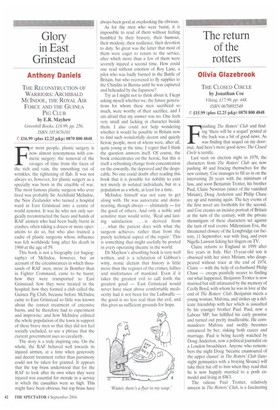Glory in East Grinstead
Anthony Daniels
THE RECONSTRUCTION OF WARRIORS: ARCHIBALD MCINDOE, THE ROYAL AIR FORCE AND THE GUINEA PIG CLUB by E.R. Mayhew Greenhill Books, £18.99, pp. 256, ISBN 1853676101 £16.99 (plus 12.25 p&p) 0870 800 4848 For most people, plastic surgery is now almost synonymous with cosmetic surgery: the removal of the ravages of time from the faces of the rich and vain, the smoothing out of wrinkles, the tightening of flab. It was not always so, however, for plastic surgery as a specialty was born in the crucible of war. The most famous plastic surgeon who ever lived was probably Sir Archibald McIndoe, the New Zealander who turned a hospital ward in East Grinstead into a centre of world renown. It was he who not only surgically reconstructed the faces and hands of RAF airmen who had been badly burnt in crashes, often taking a dozen or more operations to do so, but who also trained a cadre of plastic surgeons whose influence was felt worldwide long after his death in 1960 at the age of 59.
This book is not a biography (or hagiography) of McIndoe, however, but an account of the circumstances in which thousands of RAF men, more in Bomber than in Fighter Command, came to be burnt; how they were transported to East Grinstead; how they were treated in the hospital; how they formed a club called the Guinea Pig Club, because before McIndoe came to East Grinstead so little was known about the correct treatment of extensive burns, and he therefore had to experiment and improvise; and how McIndoe enlisted the whole population of the town in support of these brave men so that they did not feel socially excluded, to use a phrase that the current government uses so cavalierly.
The story is a truly inspiring one. On the whole, the RAF behaved well towards its injured airmen, at a time when generosity and decent treatment rather than parsimony could not be taken for granted. It appears that the top brass understood that for the RAF to look after its own when they were injured was essential for morale in a service in which the casualties were so high. This might have been obvious, but top brass have always been good at overlooking the obvious.
As for the men who were burnt, it is impossible to read of them without feeling humbled by their bravery, their humour, their modesty, their resilience, their devotion to duty. So great was the latter that most of them were eager to return to the service, after which more than a few of them were severely injured a second time. How could one read without emotion of Roy Lane, a pilot who was badly burned in the Battle of Britain, but who recovered to fly supplies to the Chindits in Burma until he was captured and beheaded by the Japanese?
Try as I might not to think about it, I kept asking myself whether we, the future generations for whom these men sacrificed so much, were worthy of their sacrifice, and I am afraid that my answer was no. One feel, very small and lacking in character beside them. I also could not help wondering whether it would be possible in Britain now to find such wonderfully decent and quietly heroic people, most of whom were, after all, quite young at the time. I regret that I think the question answers itself. Of course, the book concentrates on the heroic, but this is itself a refreshing change from concentration on the cowardly, the depraved and the despicable. No one could doubt after reading this book that it is possible for nobility to exist not merely in isolated individuals, but in a population as a whole, at least for a time.
McIndoe himself was not easy to get along with. He was autocratic and domineering, though always — ultimately — for the good of others. And only a noble and sensitive man would write, 'Real and lasting satisfaction . . . is derived from . . . what the patient does with what the surgeon achieves, rather than from the purely technical aspect of the repair.' This is something that might usefully be posted in every operating theatre in the world.
Dr Mayhew's absorbing book is very well written, and is a refutation of Gibbon's witty, ironic dictum that history is little more than the register of the crimes, follies and misfortunes of mankind. Even if it takes the greatest evil to call forth the greatest good — Fast Grinstead would never have risen above comfortable mediocrity had it not been for the Luftwaffe — the good is no less real than the evil, and this gives us sufficient grounds for hope.


































































 Previous page
Previous page